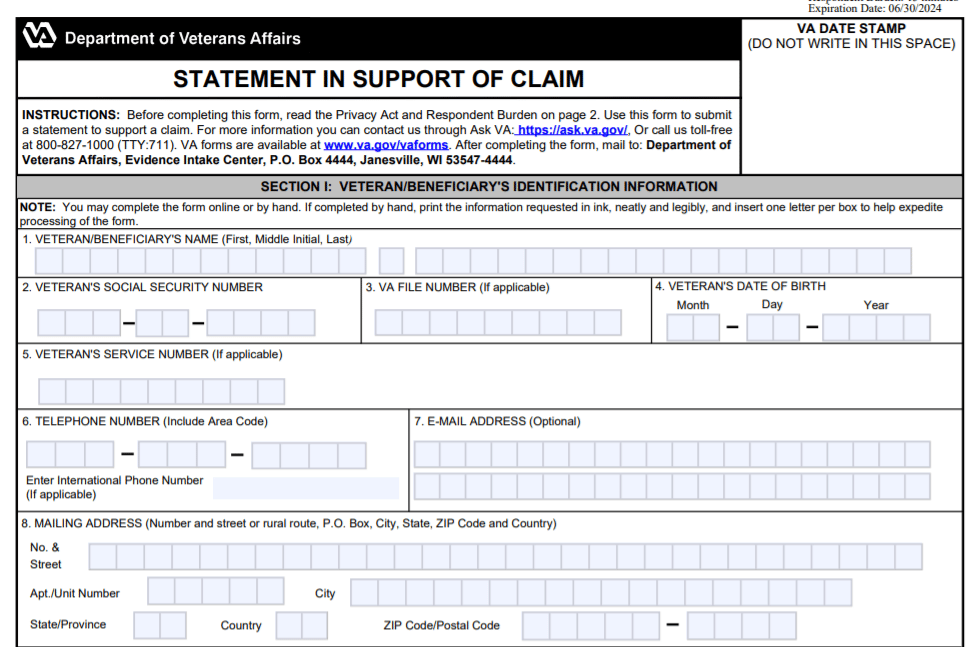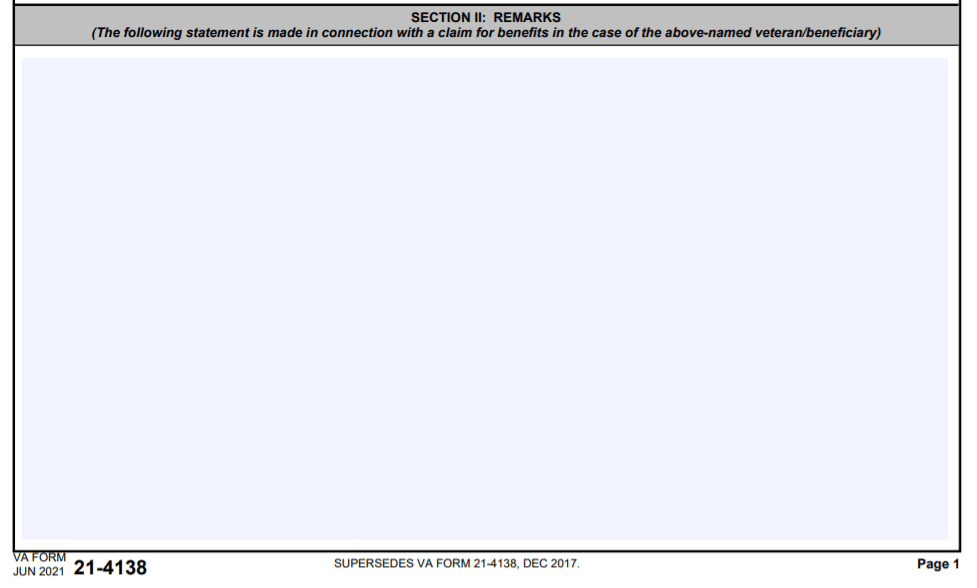
If you served in the United States military, then you may be entitled to certain benefits through the U.S. Department of Veterans Affairs (VA). This may include disability benefits for those vets who suffered a service-connected disability. If you qualify for VA disability benefits, then you will receive monetary compensation based on your level of disability.
Many veterans are able to make a successful claim for VA disability benefits based on the strength of their military and medical records alone. For most vets, however, the best way to provide a complete picture of their disability claim is to include a Statement in Support of Claim. By writing a relatively brief narrative, you can give the VA a better idea of your current symptoms, how it is connected to your military service, and how it affects your life.
Although the VA does not allow veterans to be represented by counsel for their initial disability claim application, our law firm is dedicated to helping service members achieve the best possible outcome for their disability claims. Below, we outline our best tips for writing a VA disability statement and offer a disability statement example.
Table of Contents
What Is a VA Statement in Support of Claim?
When you are applying for veteran’s disability benefits, you will need to submit a number of forms and documentation to support the claim. In many cases, a claim for VA benefits will be approved on the basis of your military records, medical records, and other evidence.
There may be situations where the VA needs additional evidence to evaluate your application for disability compensation. That is where VA Form 21-4138, or Statement in Support of Claim comes into play. Also known as a buddy statement or buddy letter, it is most often written by someone that you served with while in the armed forces.
However, anyone who has firsthand knowledge of your service-connected disability can write a statement in support of claim, including you (the applicant). It is often a good idea to submit a Statement in Support of Claim to the VA so that you can better explain how your disability is related to your military service, and how it affects your life.
Statement in Support of Claim Template

What Do You Need to Fill Out the Claim Form?
When you file Form 21-4138, you will need to provide certain information to the VA. This includes:
- Your name
- Your social security number
- Your service number
- Your VA file number (printed on any communication from the VA)
- Your date of birth
- Your contact information
All of this information must be filled out at the top of the form so that the VA can properly identify you and ensure that the statement goes to your file.
The main section of the form consists of a space for you or a buddy to write a narrative about your service-connected disability. This is where you (or a buddy) will have an opportunity to explain more about your current symptoms, how your disability is linked to your military service, and the ways in which your disability affects your life.

Recommendations for How to Complete VA Form 21-4138
When evaluating a claim, a VA rater often has to go through mountains of evidence, from service records to claim forms to service treatment records to private treatment records. When you are writing your VA disability statement, try to keep it concise. A VA rater probably won’t want to read more than 3 to 5 paragraphs, so you should aim to limit it to that length.
Your Statement in Support of Claim should contain four sections:
- Name of the current disability that you are claiming (note that you can write a different VA disability statement for each condition);
- When your disability began and why it is connected to your service;
- The current symptoms of your disability, including the frequency, duration, and severity; and
- How the disability negatively impacts your life.
For example, a veteran was diagnosed with post-traumatic stress disorder (PTSD) after being discharged from military service. A disability letter example for him is as follows:
- DC 9411, Post Traumatic Stress Disorder (PTSD) Due to Combat Deployment to Afghanistan.
- I was deployed to Afghanistan from April 2009 to March 2011. I helped to carry out counter-insurgency operations across the country. My role there was to ride ahead of conveys, searching for roadside bombs. During my time, I witnessed many of my fellow service members be killed in gruesome ways, and I saw scores of dead bodies. I feared for my life every day of my deployment and had trouble sleeping. During my deployment, my symptoms of anxiety and depression started.
- I was diagnosed with PTSD in 2012 after being discharged from the Army. I still suffer from symptoms of PTSD, including nightmares, flashbacks, severe emotional distress, feelings of hopelessness, lack of interest in activities, difficulty sleeping, self-destructive behavior, memory problems, severe anger, paranoia, and feeling detached from loved ones. I was referred to a VA Mental Health Clinic and undergo therapy and take medication for my PTSD. Despite this treatment, my PTSD symptoms continue.
- My PTSD has negatively affected my work and my personal life significantly. I got divorced from my wife and lost custody of my children. I was fired after I could not concentrate on my job and took too many days off due to my depression. I also was doing a bad job at work because of my memory issues. I have been unable to maintain relationships with friends, coworkers, and family members due to my anger issues. I have been diagnosed with depression and anxiety, and have panic attacks. The medication that I take to help these issues hasn’t relieved my symptoms.
This sample VA Statement in Support of Claim is just one example of what a person may write in support of their claim for disability benefits. Based on your current disability (or disabilities), your letter might look slightly different. For example, if you suffer from sleep apnea that is related to your service, then you would talk more about how this disability is linked to a service event and how it affects your life.
There are also times when you will want to use this form to establish chronicity or other important facts related to your claim (perhaps how you were injured or your impairment began while you were in the military).
If your disability has not already been service-connected, then you will want to provide a nexus between your military service and the disability. This should be done in the second section, in just a sentence or two. For example, if you suffer from a herniated disc in your back, then you may state that your job duties in the military required repetitive lifting and that your symptoms started while you were in the military or shortly after discharge.
Finally, it is important to give at least two specific, concrete examples of how your disability has affected your life. Rather than saying something general, like “my back injury causes a lot of pain,” try to give an example of how your current symptoms affect your daily life. You might say something like “Because of my herniated disc, I can’t sit or stand for an extended period of time, which makes it hard to hold a job or even to take long car rides. I also cannot lift anything above 10 pounds, which has made it difficult to perform basic household tasks like getting groceries and doing laundry.”
Filing for Veterans Disability? We Can Help.
A disability can make it hard to hold down a job or even manage your personal life. If your disability is linked to your military service, then you may be entitled to disability benefits from the VA. A Statement in Support of Claim can be used to bolster your claim for service connection.
At Bross & Frankel, we are proud to advocate for the men and women who have served our country. We represent veterans in all types of matters, including filing a disability claim. To learn more or to schedule a free consultation with a New Jersey veterans’ disability lawyer, give our law firm a call at 856-795-8880 or fill out our online contact form.

Rich Frankel is the managing partner of Bross & Frankel. He is a member of the New Jersey and Pennsylvania bars. He has focused exclusively on disability and social security benefits since 2005.
Mr. Frankel joined what is now Bross & Frankel after having watched his father struggle with disability, fighting a lengthy illness. Mr. Frankel founded the firm’s veteran’s law practice and substantially grew the social security disability practice, focusing Bross & Frankel’s ability to fight for all of the disability benefits available to his clients.
Mr. Frankel additionally fights for clients in court, obtaining frequent victories in Social Security appeals and against insurance companies in Federal court.